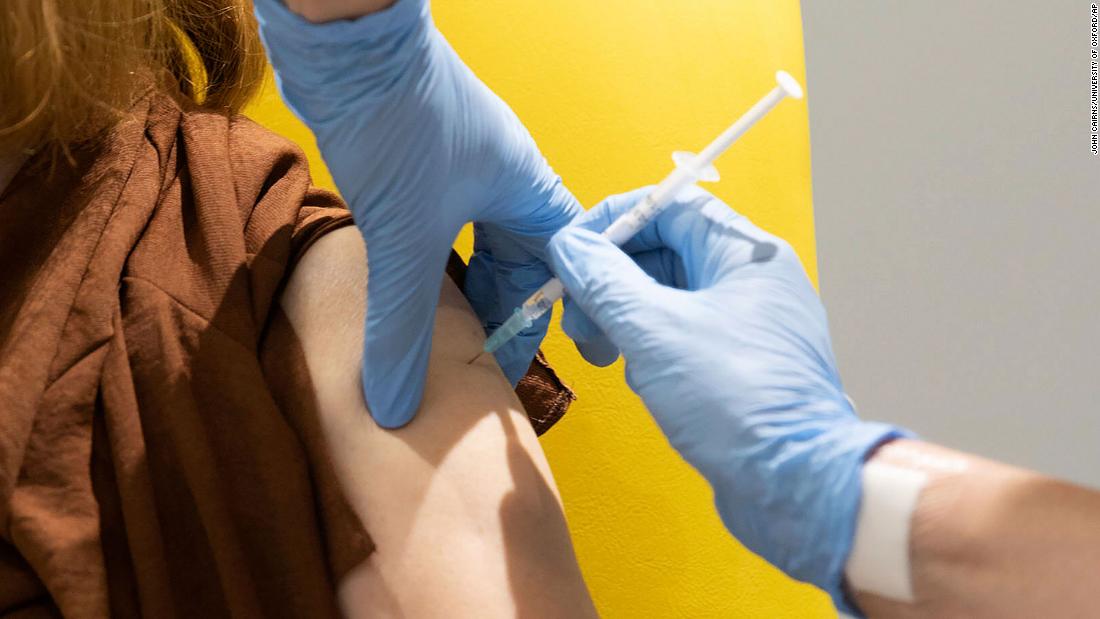In a statement, the UK government said the Medicines and Healthcare products Regulatory Agency (MHRA) had authorized the University of Oxford / AstraZeneca for the Covid-19 vaccine after « rigorous clinical trials and comprehensive data analysis by MHRA experts ».
The United Kingdom is the first country to have approved the Oxford / AstraZeneca University vaccine. The news is a glimmer of hope for the country as health services struggle to cope with the soaring infection rates.
AstraZeneca said the first doses were released on Wednesday, so that vaccinations could begin as early as the new year. The company recommends giving two doses four to 12 weeks apart.
She said in a statement: « This system has been shown in clinical trials that it is safe and effective in preventing symptoms of Covid-19, with no serious cases and no hospitalization after more than 14 days from the second dose. »
The University of Oxford in England, where the vaccine was developed, said that the UK’s Joint Commission on Vaccination and Immunization (JCVI) was expected to advise that the priority should be to give a first dose to as many people in groups at risk as possible, rather than providing the two required doses. In the shortest possible time.
« The second dose completes the course and is important for long-term protection, and everyone will still receive their second dose within 12 weeks of the first dose, a method that JCVI believes will increase the benefits of this vaccine, ensuring that people at risk can get beneficial protection and relieve pressure on service. National Health UK « .
The University of Oxford / AstraZeneca vaccine has the potential to protect millions of other people around the world quickly when regulators in other countries give approval.
The vaccine is much cheaper than the other vaccine that has been approved, and most importantly, it will be much easier to transport and distribute in developing countries than its competitors because it does not need to be stored in freezing temperatures.
« I think it’s the only vaccine that can be used in those places at the moment, » Azra Ghani, head of infectious disease epidemiology at Imperial College London, told CNN. « Pfizer and Moderna require freezer storage, which is not present in many settings. »
Minister: Wonderful news
The UK’s health services are under increasing pressure with cases of Covid-19 virus rising in many regions.
The United Kingdom recorded 53,135 other cases of coronavirus on Tuesday, breaking the daily record since the epidemic began for the second consecutive day.
Dr Susan Hopkins, chief medical advisor for public health in England, said in a statement: ‘We continue to see unprecedented levels of COVID-19 infection across the UK, which is a matter of grave concern especially as our hospitals are the most vulnerable.’
British Health Secretary Matt Hancock welcomed the approval of the Oxford / AstraZeneca vaccine in an interview with Sky News, describing it as « great news ».
He said that the country’s National Health Service (NHS) « is standing ready to publish, at the pace required, to be able to help us out of this epidemic by spring. »
The UK government said the University of Oxford / AstraZeneca vaccine met « stringent standards for safety, quality and efficacy » when it announced approval.
« The NHS has a clear delivery plan and decades of experience in providing vaccination programs on a large scale, » the statement said. « Hundreds of thousands of patients have already been vaccinated with the Pfizer / BioNTech vaccine and its implementation will continue. Now the NHS will start putting into practice its comprehensive preparations for the introduction of the Oxford / AstraZeneca vaccine. »
Dosing regimen
« It is exciting that we found that one of our dosing regimens could be approximately 90% effective, and if this dosing regimen were used, more people could be vaccinated with the planned vaccine supply, » said Andrew Pollard, chief investigator for the Oxford vaccine trial. In November.
The Oxford / AstraZeneca vaccine can be kept at a refrigerator temperature of 2 to 8 degrees Celsius (36 to 46 degrees Fahrenheit) for at least six months. Moderna vaccine should be stored at a temperature below 20 ° C (minus 4 ° F) – or in refrigerator temperatures for up to 30 days – and the Pfizer / BioNTech vaccine should be stored at minus 75 ° C (minus 103 ° F)), They are used within five days, once cooled at higher temperatures.
Cold Chain Cold is the standard storage used worldwide to deliver vaccines from central sites to local health clinics. Ghani added that so far, the AstraZeneca vaccine « is the only one that can definitely be delivered to these systems. »
Vaccines depend on various technologies. AstraZeneca’s offer – like Russia’s Johnson & Johnson and Sputnik V vaccine – uses adenoviruses to transfer genetic parts of the coronavirus into the body.





